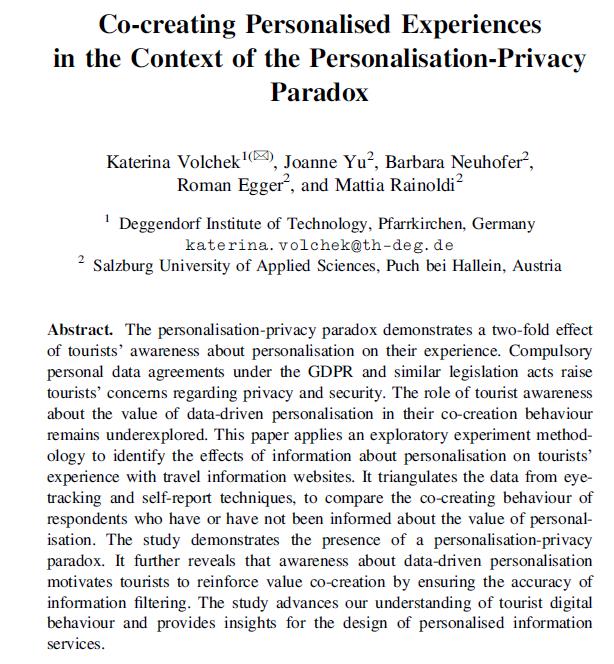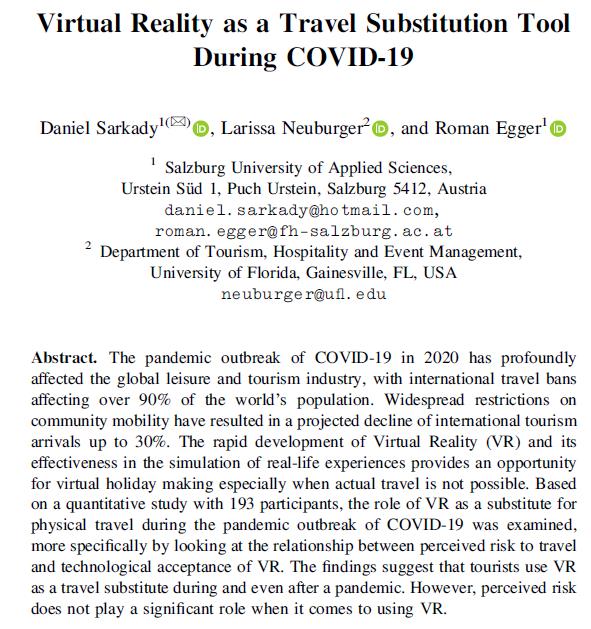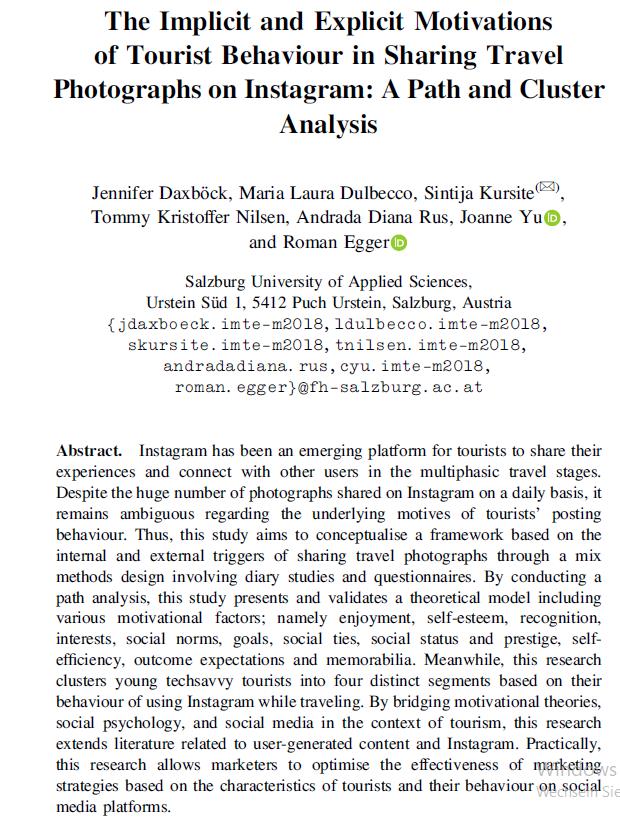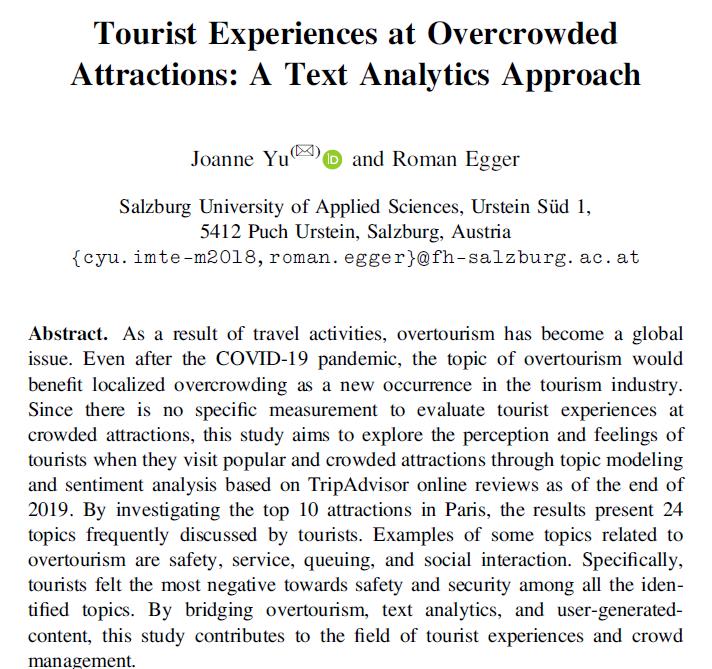The fourth and last presentation at the ENTER21 Conference was entitled: “Virtual Reality as a travel substitution tool during COVID-19” and presented by Daniel Sarkady. This research uses a structural equation model to analyze if VR has the potential to substitute travel during the pandemic. Well done Daniel! The full paper can be downloaded here!
Category Archives: Conferences & Events
Best Paper Award – 2nd Place
Yesterday Joanne presented our paper “Tourist experiences at overcrowded attractions: A text analytics approch” at ENTER 2021 and already today we can be happy about the 2nd place at the Best Full Paper Award. It fills me with pride when I see what kind of achievements you can bring your students to, especially when you consider that master students can prevail against old-established professors.
Tourist Experiences at Overcrowded Attractions: A Text Analytics Approch – the Presentation @ ENTER21
Joanne Yu presented our paper “Tourist Experiences at Overcrowded Attractions: A Text Analytics Approch” at the ENTER 21 Conference. We did an analysis of 5000 English TripAdvisor posts each, for the most 10 popular tourist attractions in Paris. We did an Latent Dirichlet Allocation (LDA) and Sentiment Analysis (Vader) and got some quite interesting insights… Just have a look!
If you want to reach our full paper (nominated for the Best Paper Award this year), download it here.
Motivation to post on Instagram while traveling – the ENTER 21 presentation
Sintija Kursite just did a great presentation on behalf of her research group (eTourism Research – 3rd Semester Master) and me. We did a Structural Equation Modeling and a Cluster Analysis about Instagramers and their motivation to post on Instagram while traveling. The ENTER Prodeedings are open access this year, so just download our paper here.
ENTER 2021 – we are coming!
I am proud of the research I can do with my Master’s students. Next week we will be presenting no less than 4 papers – including a best paper nomination at the ENTER-Conference 2021 (Information and Communication Technologies in Tourism).
The proceedings will be published as open access this year. Check: https://lnkd.in/eXp_jFb
#research #tourism #students #science #
ENTER-Conference: 2nd Place – Best Paper Award
At the international ENTER conference, the world’s largest eTourism conference, which took place this year in Guildford at the University of Surrey in the UK, our Masterprogram achieved great success, as we were awarded second place in the Best Paper Award for their paper entitled “Exploring the Impact of Multisensory VR on Travel Recommendation: A Presence Perspective”.
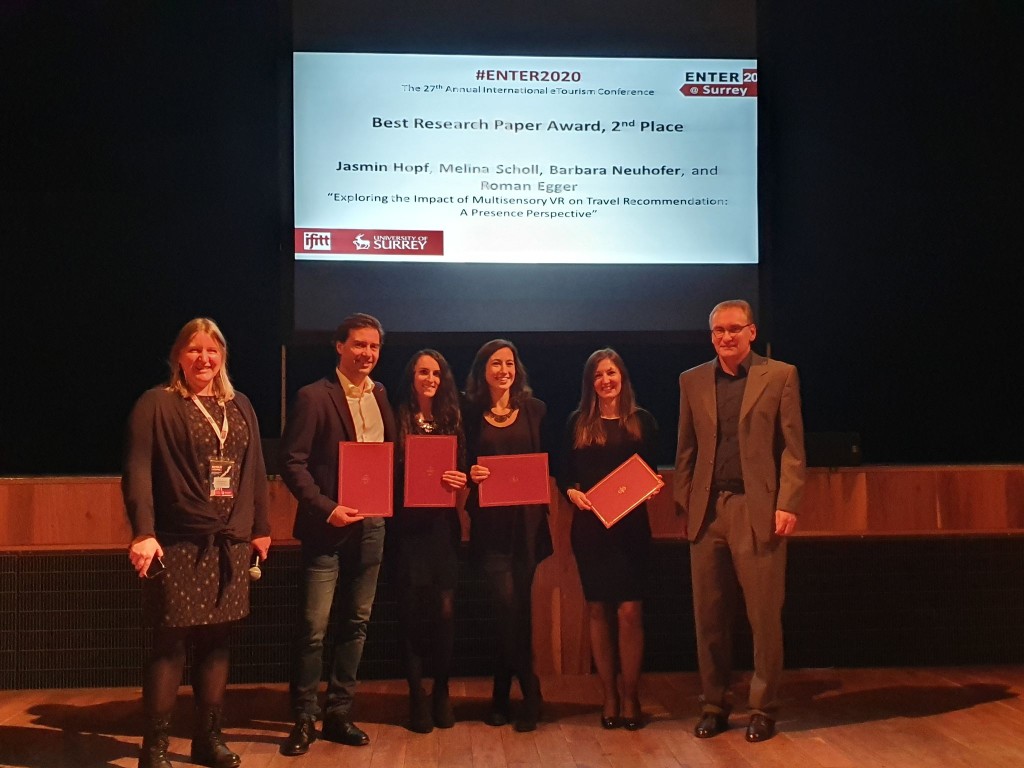
left to right: Roman Egger, Jasmin Hopf, Melina Scholl, Barbara Neuhofer
Roman Egger and Barbara Neuhofer had submitted a paper from the Research Seminar together with Master students. “With a rejection rate of 60%, ENTER is considered very selective. The fact that we were then nominated and even achieved second place makes us all the happier”, reports Roman Egger, head of the eTourism department and head of the Key Competencies & Research Methods. “In addition, you have to bear in mind that there were no other Master’s students presenting at the conference, so the competition was definitely very strong,” he adds.
The innovative study brings together the topics of eTourism and experience design. “We have researched how VR can be enriched with all senses in the future, resulting in an immersive experience for the participants”, says Barbara Neuhofer
Over the course of several semesters, the Master’s students work on a research project and the publication, which can then be submitted to a conference. This is a good opportunity to get students interested in research. The successful supervision of the scientific work is confirmed by this. Already in 2019 students could present their paper at the ENTER conference in Cyprus.
The participation gives students an insight into the academic world and has already inspired some of our students to continue with PhD studies.
The Rectorate and International Office of the FH Salzburg supported the students financially, so that they could present their publication on site. The next ENTER Conference will take place in China in 2021.
More information: https://enter2020.ifitt.org/
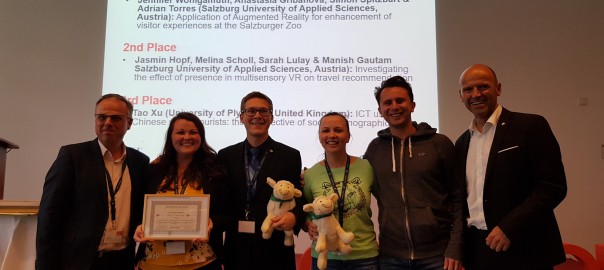
ISCONTOUR 2019, 8th International Student Conference in Tourism Research
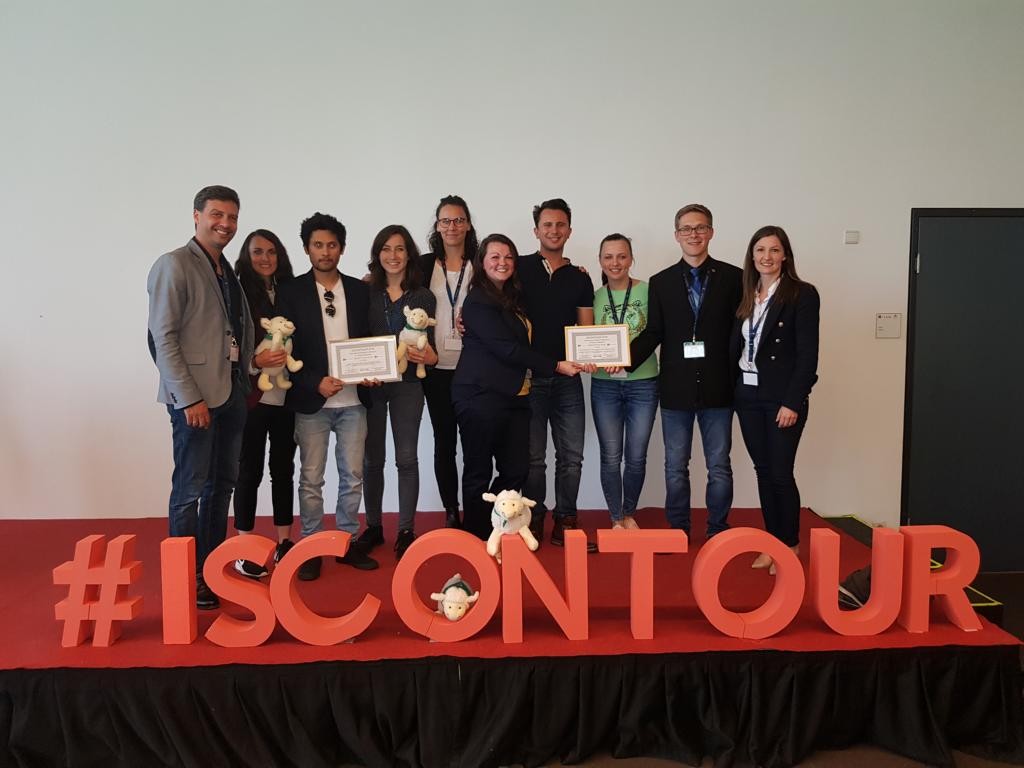
This year’s International Student Conference on Tourism Research (ISCONTOUR), organized jointly by FH-Krems and MCI Innsbruck, attracted about 300 participants from over 30 nations to Innsbruck to present their accepted papers.
Master’s students of the program Innovation and Management in Tourism (IMT) were also represented. The articles from the research seminar series “eTourism Research” (Prof. Roman Egger and Prof. Barbara Neuhofer) were submitted and all six papers were assessed in a tripple-blind-review procedure, despite a 50% rejection rate. Thus, the entire 4th semester of the Master students was on site to present their results at the ISCONTOUR.
The culmination of the event was the Best-Paper Award. Two groups won first and second place in the Best ICT Paper Award at the international competition. Victory was won by the study group Augmented Reality. They developed an AR prototype for the Salzburg Zoo to provide information about animals living in the zoo and tested the acceptance of such a solution. Second place went to the Virtual Reality group. In an experiment and with the help of biofeedback (heart rate, skin conduction ), they examined how 4D Virtual Reality (as additional stimuli, smells, wind, heat, etc.) differed from classic virtual reality in a holiday scenario with respect to the construct “presence”.
Presentation at INVTOUR
Igor Gula recently presented our paper on open innovation at the INVTUR Conference at the University of Aveiro in Portugal. The paper “Open Tourism – Structuring opening ovements in the tourism industry using the Contribution-Utilization-Matrix” was written by Roman Egger, Igor Gula and Dominik Walcher. You can download the paper here and the presentation from Igor here: INVTUR2017_Egger, Gula, Walcher_Open Tourism.


Igor Gula with Dimitrios Buhalis
The Future of Wearable Devices on Site
This year IMTE-Master-Students presented their research at the ENTER Conference in Rome. Here is an extended abstract of what they did and what they found out….
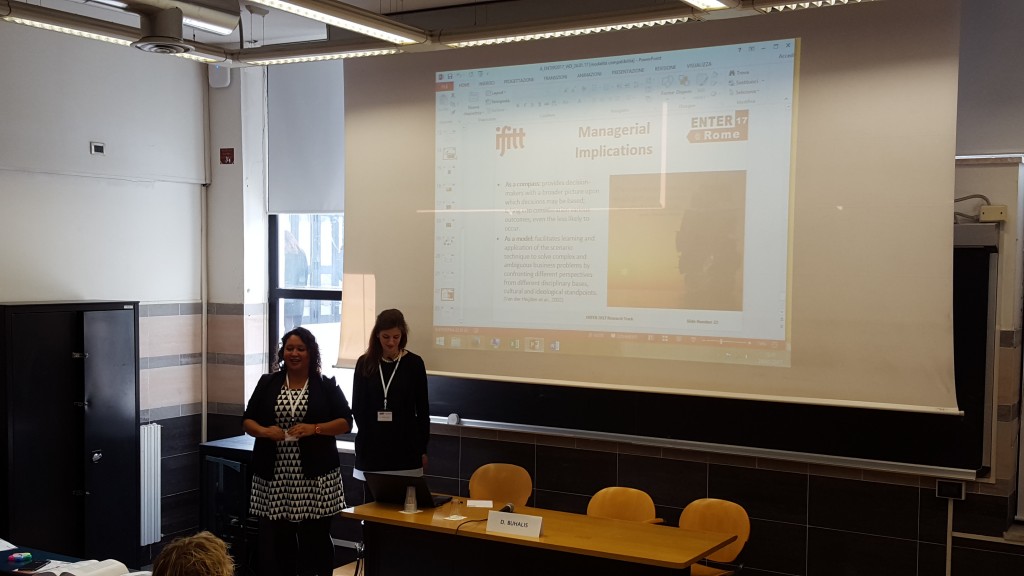
This study is the first of its kind to apply the scenario technique approach to explore the future of wearable technologies in tourism. Nowadays, mobile devices have become central in the tourism industry, addressing not only the inspiration and planning stage, but also the experience on-site (Neuhofer, Buhalis, & Ladkin, 2014). Recently a new form of technology has emerged in tourism: wearable devices. This technology is expected to have an effect on how tourists would look, communicate and interact with their environment in the future, mediating their experience by facilitating practical functions such as communication, navigation, information search and health monitoring (Tussyadiah, 2013). Although they are not claimed to replace smartphones any time soon, wearables are considered to be the technology of the future that will transform the way people interact with the surroundings (Prabu, 2012; Dickey, 2013).
Given the changing roles wearables might play in the future of tourism, this research adopts the scenario technique approach to propose plausible and possible future scenarios of use of wearable devices on-site. As starting point of the Scenario technique approach, focus groups were conducted to gain an understanding of the core factors influencing the future use of wearable devices in an on-site tourism context. Software, Hardware, Network & Infrastructure, Comfort & Embodiment, Functions & Usages, Reliability and Third Party Access were identified as the most influential factors. Out of a vast number of possible scenarios generated combining all the future developments of the identified factors, four scenarios were chosen based on the most plausible and contrasting combinations of the most influential driving forces (Schüll & Schröter, 2013). The four scenarios, which are presented through narratives named as Awesome, Meh, Grumpy and Evil, depict not only why and how wearable devices such as smartglasses and smartwatches might be used in the near future by tourists on-site, but also outline how the visitor’s experience might be affected. While one scenario presents a situation where embracing technology enhances the tourist’s experience, hence maximising customer values and enriching user’s skills (Neuhofer et al. 2014; Tussyadiah, 2015), the other scenarios depict alternative situations where wearable devices fail to enable meaningful positive experiences.
Get a preview of the article here
VR-Summit Salzburg
Salzburg University of Applied Sciences hosts the first VR Summit Salzburg 2016 which takes place on 5th of October. The event starts at 2 pm and offers besides different speeches and panels also various exhibitions. The summit is characterized by its’ interdisciplinary program – the main topics being VR and entertainment, VR and health care and of course, VR and tourism. Our VR research group will also be present and give an overview about the different projects we are working on. Step by and check it out.
Register now! We will be there – and we are looking forward to see you there as well!


